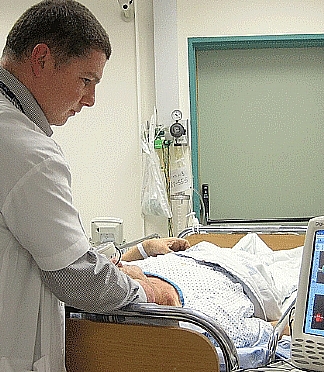The neurology department of the Hillel Yaffe Medical Center continues to expand the services it provides to the community. In the past month, a clinic has opened that uses transcranial Doppler (TCD) technology, in order to allow those who have suffered a stroke, the number 2 cause of death in the western world, to undergo noninvasive imaging examinations, which can aid in preventing another stroke.
What is the TCD exam?
“The TCD exam is an exam that allows for the imaging of the intracranial blood vessels in a noninvasive manner with the aid of Doppler technology (sound waves)” explains Dr. Sergio Shabtai, Deputy Director of the Neurology Department at the Hillel Yaffe Medical Center and the director of the new clinic. “The use of the machine allows for the identification of a number of causes for the occurrence of the stroke in an accurate manner. In other words, whether the stroke was caused by constriction of the intracranial blood vessels, or caused by blood clots (which can arrive at the brain from various and faraway places in the body).” As a result, this technology can be used to identify the passage of blood clots between the chambers of the heart (Patent Foramen Ovale), in order to make decisions concerning future surgeries for the closing of the PFO by stenting. In cases of intracranial blood vessel constriction, the test allows one to make a more accurate decision of whether or not to undergo the procedure of inserting a brain stent and expanding the damaged blood vessel.
Likewise, in cases where brain death is suspected, the TCD machine is a significant aid for accurate diagnosis of disruptions in blood flow to the brain.
A particular population for which TCD exams can be performed is children suffering from a hematological disease that can cause strokes at a young age (Sickle Cell Disease), the exam can diagnose intracranial blood flow disruptions at an early stage in children suffering from this illness and allow the administration of better treatment in order to prevent strokes at a young age. “It is important to note,” stresses Dr. Shabtai, “that the international organizations involved in stroke prevention all agree that the use of the TCD machine is essential in the prevention, diagnosis and future treatment of strokes.”
How is the exam performed and what are the benefits?
There are two main types of TCD exams – without injection (standard) and with injection. The exam without the injection (standard) uses Doppler technology (ultrasound) in order to examine most of the large blood vessels of the brain through the skull. The second type of exam, the exam performed with the injection of an air bubble with sterile liquid into a vein, is designed to assess the presence and severity of a channel between the chambers of the heart – PFO. Currently, the TCD machine, whose operation requires skill and training, is an important tool and is almost inseparable from the general etiology of vascular illnesses of the brain, mostly among patients who have suffered a stroke or cerebrovascular accident, along with examinations like brain CT scans, brain MRI, ultrasound of carotid arteries, heart ultrasound and heart rate monitoring. The significant advantage of the exam is that it doesn’t involve any radiation and can be performed by the patient’s bedside even in cases of severe strokes that require intravenous anticoagulant treatments. In addition, it can show improvements in blood flow in blocked blood vessels of the brain in real-time. As mentioned, due to its high level of accuracy, the results of the exam allow the doctor to perform a more efficient diagnosis according to which future decisions will be made that are more effective for the patient, including assessing the need for intervention to perform a stent operation to expand blood vessels in the brain and other places.
How to get to the clinic at Hillel Yaffe?
The decision determining the need to perform a TCD exam is one that is for the most part made by a patient's neurologist, cardiologist or general doctor. Arriving at the clinic that operates at the Hillel Yaffe Medical Center on Thursdays is by appointment made through the secretary of the Neurology Department. The patient must have a referral from a doctor and a financial obligation form from the patient’s insurance provider (form 17).











.jpg?BannerID=39)

